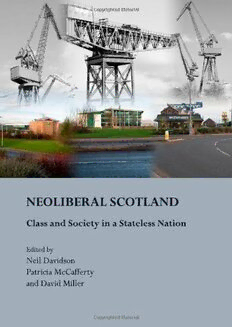
Neo-Liberal Scotland: Class and Society in a Stateless Nation PDF
Preview Neo-Liberal Scotland: Class and Society in a Stateless Nation
Neoliberal Scotland Neoliberal Scotland: Class and Society in a Stateless Nation Edited by Neil Davidson, Patricia McCafferty and David Miller Neoliberal Scotland: Class and Society in a Stateless Nation, Edited by Neil Davidson, Patricia McCafferty and David Miller This book first published 2010 Cambridge Scholars Publishing 12 Back Chapman Street, Newcastle upon Tyne, NE6 2XX, UK British Library Cataloguing in Publication Data A catalogue record for this book is available from the British Library Copyright © 2010 by Neil Davidson, Patricia McCafferty and David Miller and contributors All rights for this book reserved. No part of this book may be reproduced, stored in a retrieval system, or transmitted, in any form or by any means, electronic, mechanical, photocopying, recording or otherwise, without the prior permission of the copyright owner. ISBN (10): 1-4438-1675-2, ISBN (13): 978-1-4438-1675-5 TABLE OF CONTENTS List of Tables.............................................................................................vii Introduction................................................................................................ix Neil Davidson Chapter One.................................................................................................1 What was Neoliberalism? Neil Davidson Part I: Class Chapter Two..............................................................................................93 Who Rules Scotland? Neoliberalism, the Scottish Ruling Class and its Intellectuals David Miller Chapter Three..........................................................................................137 Financialisation and Proletarianisation: Changing Landscapes of Neoliberal Scotland Alex Law and Gerry Mooney Chapter Four............................................................................................161 Resisting the Neoliberal “Modernisation” of Public Services in Contemporary Scotland: the Case of Public Sector Workers Patricia McCafferty and Gerry Mooney Part II: Society Chapter Five............................................................................................183 Environmental Justice in Scotland: Incorporation and Conflict Eurig Scandrett vi Table of Contents Chapter Six..............................................................................................203 Creating the Neoliberal City and Citizen: The Use of Gentrification as Urban Policy in Glasgow Kirsteen Paton Chapter Seven..........................................................................................225 People Move On: The Politics and Policy of Migration from Central and Eastern Europe to Neoliberal Scotland Colin Clark Chapter Eight...........................................................................................267 Criminal Justice: A Test of Scottish Distinctiveness Susan Wiltshire Chapter Nine............................................................................................295 An Attitude Problem? Confidence and Well-being in Scotland Iain Ferguson Chapter Ten.............................................................................................315 Neoliberal Politics in a Devolved Scotland Neil Davidson Bibliography............................................................................................379 Tables......................................................................................................431 Contributors.............................................................................................445 Index........................................................................................................449 LIST OF TABLES 2:1: Top Ten Scottish Corporations........................................................ 431 3:1: Ten Richest Individuals in Scotland, 2007.......................................431 3:1: Financial Resources by Net Annual Household Income, 2003-2004................................................................................................432 3:3: Typical Form of Debt by Income Band............................................433 3:4: Outstanding Debt by Income Group, 2003-2007 (£000s) ...............433 3:5: Manufacturing Employment Change in Scotland, 1966-1984.........434 3:6: Employment by Sector in Scotland, 1981-2001 (thousands)...........434 3:7: Employee Jobs by Industry in Scotland, 2000-2006 (thousands).....435 3:8: Productivity per Employee in Scotland, 2004..................................436 3:9: Income Deciles by Industrial Sector, 2006.......................................437 3:10: Change in Sectoral Employment in Edinburgh and Glasgow, 1997-2005................................................................................................438 3:11: Gross Median Weekly Earnings in Edinburgh and Glasgow, 2006.........................................................................................................439 3:12: Gender Gap in Median Gross Weekly Earnings: Full-time Employees by Occupational Group in Scotland, April 2004...................439 3:13: Employees in Scotland by size of establishment, 2006..................439 4:1: Industrial Disputes Involving Public Sector Workers in Scotland, 1998-2007................................................................................................440 4:2: Selected Public Campaigns in Scotland, 1997-2007...................441-42 6:1: Increase in Houses Price Sales: Intermediate Geography, City and National Level, 1997-2007...............................................................443 INTRODUCTION1 NEIL DAVIDSON Readers of the Sherlock Holmes stories will be familiar with the dialogue in “Silver Blaze” concerning the curious incident of the dog in the night time.2 The famous exchange between Inspector Gregory and the great detective, on which the plot of the story turns, concerns an episode in which a dog might have been expected to bark, but did not. Similarly, academics based in Scotland, particularly the minority who also act as public intellectuals, might have been expected to analyse the effects of neoliberalism in that country. Such expectations have, however, been disappointed–and not because the advance of neoliberalism was halted at the Tweed. Given the exceptional extent to which Scotland is integrated into the capitalist world economy, such a miraculous deliverance was never very likely, whatever the wishes of local politicians and state managers–and these groups have, of course, been far from resistant to the new dispensation. The UK, along with the USA, was one of the first sites for the neoliberal experiment in socio-economic engineering. Indeed, one of the flagship policies of the second phase of British neoliberalism, the Private Finance Initiative (PFI), was launched in Scotland from 1995 with the construction and commercial operation of the Skye Road Bridge.3 As part of the British state, Scotland has experienced, and continues to experience, the effect of these policies to the same extent as the rest of the UK, with only minor variations since the establishment of devolved government in 1999. Indeed, in many respects, the application of neoliberalism actually became even more extensive under the Labour and Liberal Democrat governments than it had under their Conservative predecessors, and this has yet to be addressed, other than at the margins, by their minority Scottish National Party (SNP) successor. Yet only with the onset of a new period of capitalist crisis in 2007-08 did commentators 1 This foreword was written with the support of Economic and Social Research Council Grant RES-063-27-0174. 2 Conan Doyle, “Silver Blaze”, 25. 3 Anderson, The Skye Bridge Story; Monbiot, Captive State, Chapter 1.
